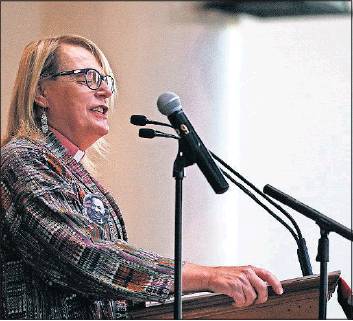Donnie Anderson to pastor Methodist church in Provincetown
Former executive minister of the Rhode Island State Council of Churches, who identifies as a woman, will also speak at colleges about transitioning and faith
By Donita Naylor Journal Staff Writer
The Rev. Donnie Anderson met her new congregation Sunday, when she was introduced as the new pastor of the United Methodist Church in Provincetown, Massachusetts.
Anderson, who had taken a three-month sabbatical as executive minister of the Rhode Island State Council of Churches while she pursued her transition to a woman, resigned in January, saying she “felt a call to church ministry.”
“I’m very excited,” she said by phone Sunday from her new apartment in Provincetown. She had last been a pastor with a congregation 13 years ago, when she left the First Baptist Church of East Greenwich.
She wasn’t sure what church “would be willing to hire a 72-year-old pastor … who is transgender.”
Out of the blue, she said, she got a call from the district superintendent of the United Methodist Churches of Southeast Massachusetts and Rhode Island, asking if she would consider being pastor of the Provincetown church. The job would be 20 hours a week.
The hours were perfect. “I wanted to take advantage of a little bit of retirement,” she said, and “some opportunities have come my way to speak a little bit on college campuses.”
She would speak about the transgender process and about “the intersection of transgender and faith.”
Many of those in faith communities believe “you can be authentically who you are and you can be a person of faith, but you couldn’t be both,” she said. “That’s not true. It’s just not true.”
Transgender people, she said, “are part of the Kingdom of God…. it’s really important that we have these conversations on college campuses” and in faith communities.
“The position in Provincetown gives me a chance to be a pastor and deal with all the things a pastor deals with all the time, and also try and share with the transgender community that, contrary to what they’ve been told, God does love them.”
Young people are especially vulnerable to the confusion and shame that result when their authentic self “is continuing to tell you who you are,” and it’s in conflict with common gender notions.
The suicide rate in the general population, she said, is a little more than 4%, but the suicide rate in the trans-gender population is 40%. “It’s even higher than that with adolescents,” she said.
Her new church is small. But, she said, “it’s amazing. In the building there’s a soup kitchen every day, a thrift shop that raises money to support the ministry of the church, a food bank, a clothing bank, a pet bank” that offers food, not animals, to people in the tourist industry whose income dries up in the off season, and “a lot of 12-step groups meet in the church” which also provides space for a nonprofit that works with the homeless.
“You don’t have to be a large church to have a mighty influence,” she said.
Average attendance in the winter is about 30, and in the summer between 50 and 60, she said. She has been meeting volunteers and attending meetings as decisions are made for dealing with the coronavirus.
Anderson is moving to Provincetown by herself. Her former wife has returned to her maiden name, Debbie Jamieson. The two are friends and support each other.
“The great sadness for me, and for many who are trans-gender who are older, is that for us to be our authentic selves, sometimes the result is very, very painful for people that we love and care for.
“If I want the freedom to be authentically who I am,” she has to have “the opportunity to be authentically who she is.”
She deflected a question about her physical transition. “For some people, surgery may or may not be part of that, so many of us do have surgery to help deal with the dysphoria.”
Transitioning “is about affirming and living out your authentic self." dnaylor@ providencejournal.com
(401) 277-7411
On Twitter: @donita22
